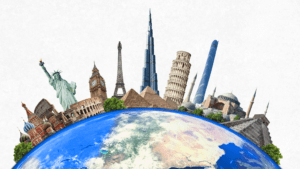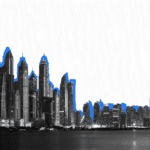We’re all most definitely aware that Russia and Ukraine have been embroiled in a war. This eruption is the biggest military conflict in Europe since World War II, taking many investors by surprise as tensions creep into the still-recovering global economy.
Here’s an overview of what’s happening, the effect on the global market, and what to expect in the MENA region.
What’s Going On?
This Russia-Ukraine conflict is a long and complicated one for sure.
Essentially, all about the future of the former Soviet republic – Ukraine. In fact, after Russia’s 2014 annexation of Crimea from Ukraine, there’s been an ongoing conflict in the region, known as the Donbas, between Ukraine’s troops, pro-Russian separatists, and Russian troops sent over by Putin as ‘peacekeepers’.
With the current political turmoil, Russia is now reckoning with a slew of tough economic sanctions, aside from the ones it was under after it had seized Crimea. Sanctions imposed by the West have targeted banks, financial institutions, and leading oligarchs, among other measures, curbing their access to global markets. The ruble has since plunged to record lows against the dollar, along with a fall in stocks and surge in energy and food prices, impacting regional stability, and ultimately markets worldwide.

What Does This Mean for The Commodity Markets?
As with any major geopolitical event, volatility in markets is expected. Considering Russia’s significant global influence on the commodity markets, particularly oil, raw materials, and wheat, any curb in the supply of these commodities is a recipe for inflation. So, which markets are they?
- Energy
Russia is the world’s third-largest oil and natural gas producer, supplying 40% of Europe’s gas and accounting for more than a tenth of the global market share for oil. One of the first implications of the Russia-Ukraine conflict in fear of potential supply disruption is the increase in the price of these energy commodities, with Brent crude oil climbing past $100 a barrel for the first time since 2014, and European gas jumping as much as 62% last week.
A surge in these energy commodities also means a spike in heating and gas bills across Europe. Though the prices came down the following day, markets remain choppy as ever.
- Food
Both Russia and Ukraine, the latter nicknamed the breadbasket of Europe, produces around a quarter of global wheat exports. War could impact the production of wheat and grains, meaning the supply would be limited, potentially raising the cost of everyday food items in countries like Egypt and Turkey that rely heavily on their goods. Though some countries, such as the UK, produce most of their own wheat, they still rely on fertilizer – one of Russia’s biggest exports.
- Essential Metals
Another commodity fueling inflationary pressure is the possible shortages of essential metals ranging from palladium, used in car manufacturing, to gold and nickel, creating another disruption to global supply chains already recovering from the pandemic.

How is the Dubai Real Estate Market Affected?
As for Dubai’s property market, there’s been a spike in transactions since the war began in February. As per a report released by Reidin, transaction prices in March have surpassed the whole of February’s numbers, along with an increase in yields across all bedrooms. Further to that, transaction numbers and values are quickly catching up to February’s figures, despite the data covering only the first half of March.
Prior to the war, unprecedented sanctions, and crumbling economy, Russians were among the top purchasers of real estate given that the UAE has long been a magnet for Russian oligarchs, nevermind being a major global tourist and investment hub. Amid the ongoing war, even more, wealthy Russians are seeking refuge in the UAE in order to shield their assets. By purchasing property in Dubai, even liquidating their crypto assets to do so, as well as setting up businesses, they’re now shifting their fortune from formerly neutral countries, like Switzerland, into the Gulf.
Indeed, the UAE’s neutral stance has given Russians the green light to shield their wealth in the region. That being said, Russians are not only able to just park their assets in the UAE, but doing so allows them to obtain citizenship. After all, buying property is a means by which people permanently move to the UAE, as investments of AED 750,000 in real estate secure three years’ residence. Even larger investments secure longer-term ‘golden-visas’, granting investors a 10-year residency.
Will the Russia-Ukraine Conflict Affect Other Gulf Markets?
Though there is no direct impact predicted as of yet, there are more indirect implications beyond Europe, particularly in oil-producing Gulf countries. With a risk of further inflation spiking fear among investors and markets, this impact will surely trickle into other areas.
As we saw during the pandemic, minor interruptions in one region can generate major disruptions elsewhere. Supply shortages and price surges of commodities like oil, wheat, and metal, can skyrocket in a still-recovering economy.
With that being said, the Gulf economies could benefit from the surge in energy prices, as increased output and higher export revenues in energy commodities, like oil and gas, may bolster their position, given Europe shifts away from its reliance on Russian gas. Additionally, the GCC are important exporters of essential metals like aluminum, as well as fertilizers, meaning the surge of those prices could also boost their non-oil export revenues.
Moreover, goods exports to Russia and Ukraine from all MENA countries constitute less than 1.5 percent of total exports, meaning that exports to both Russia and Ukraine are not sizable enough to have a direct impact when compared to other economies in Europe, for example.
However, the tourism and hospitality sector in countries like gulf regions like the UAE, as well as North African countries like Egypt and Tunisia, could be impacted, since these regions are quite popular locations for Russian tourists, in particular, as they make up the third-largest source of visitors to Dubai.
Bottom Line
Conflicts are inherently unpredictable but swings in financial markets are bound to happen. The UAE has taken a neutral stance, so there shouldn’t be any concern about direct impact. However, inflation is inevitable, with fuel prices in the UAE raised by almost 10% this March.
Generally, global markets will certainly remain volatile over the next few weeks, but if we’ve learned anything from history, it’s that real estate investments are considered a safe haven in times of war, and act as a hedge against soaring inflation.
For now, there’s no need to worry or drastically reassess your investment strategy. But you should keep in mind that diversifying your portfolio is one of the most effective ways to hedge against inflation over the long term, so you might consider expanding your investment horizon to reduce your portfolio risk. In the meantime, with the devastating events happening in the war between Russia-Ukraine, all we can do is hope that these tensions are soon resolved.






